Dodgy - Interview
by Olga Sladeckova
published: 21 / 3 / 2002
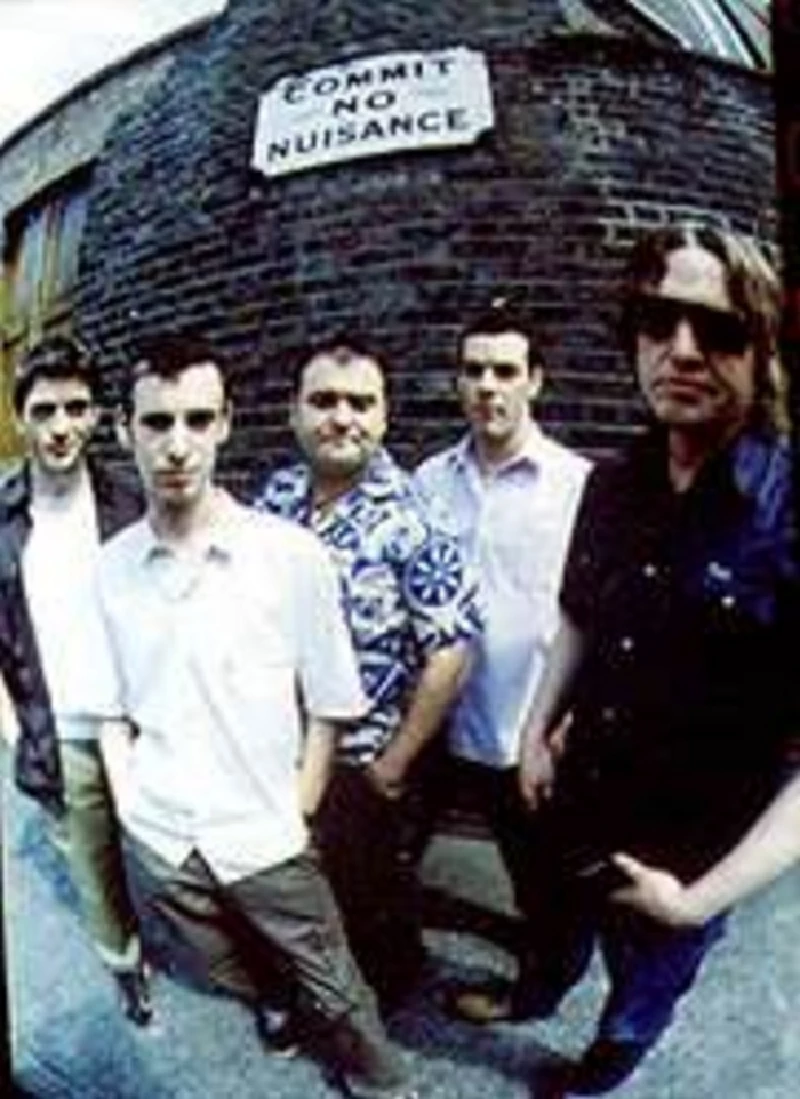
intro
Always happy sounding, Dodgy were one of the bestselling and most popular actts of the mid 90's. Drummer Matthew Pirest and guitarist Andy Miller talk to Olga Sladeckova about the group's rise to fame and history
Have you ever wanted to be a rock, pop, jazz, or a whatever star? Have you ever thought what it would be like to be sell hundreds of thousands of records? Can you imagine the popularity and attention that you would get? Most of us can only dream about such things. What would it be like though to have those things and what does it take to get them? Once upon a time there was a band that had had all this. You probably know them. They are called Dodgy. Dodgy’s history can be traced back to 1986 when drummer Matthew Priest and vocalist and bassist Nigel Clarke first met up when they started playing together in a Goth band, Three Cheers for Tokyo. "I was in a band in Birmingham with Nigel ” recalls Matthew, standing backstage at the London venue Water Rats after he has finished drumming for his friends in a new band, Satellite. “We decided that Birmingham wasn’t the place to be in a band. London was supposed to be the pavement.” The pair quickly began looking for a guitarist to join them and to form another group . “We came down to London in about 1988 or 1989 and put an advert in a paper that said: “Hendrix wanted” and that’s how we got Andy Miller.” explains Mathew. “Sadly it is true.” agrees Andy. who has come to the Water Rats tonight to support Matthew. “They came up with me. They had auditioned about 40 other guitarists. I happened to be the 40th one.” “He turned up in a jumper and floppy shoes” laughs Mathew, “And he was lovely. That’s when Dodgy was born really, back in 1990 in Hounslow , a horrible part of London. It only took a year or so for us to get signed after that because that our chemistry was so good.” The only thing that the band was still missing was a name. “We were taking a trip on a tube back to Hounslow and we were tripping up on magic mushrooms” admits Matthew. “And the name ‘Dodgy’ seemed like a fantastic idea at the time because it’s totally self deprecating. It’s like: “Oh, dodgy T-shirts, dodgy records, music…” As we were all tripping on mushrooms, whenever we said “dodgy” ,it just sounded really funny, so, we made a pact. We said: “That’s it. We are definitely going to call ourselves Dodgy!” And then we all woke up the next day going: “Oh, shit!”. It kind of worked against us because it takes the piss. and is so self-deprectaing. “In Japan the word ‘dodgy’ means the ability to be human.” Matthew adds on a more serious note. “Very human which means the ability to make mistakes which I think is what life is about. You make mistakes and you learn from it.” Now that Dodgy had found themselves a name, they immediately started working hard on their repertoire and began endless rehearsals. Although they worked hard, it didn’t seem to be enough, enough to make them differ from the many other bands in the same position. They needed something more then good music, something else to promote themselves with and to atract a bigger fanbase. “Because the Rolling Stones had a club (The Crawdaddy Club-Ed),” says Andy, “we thought it would be a really good idea to do something similar to that, to have something going on every 2 weeks or whatever and to build up our fanbase in that sense. “ “Yeah.”agrees Matthew. “If you want to do a gig in London , all you have to do is you ring up the Bull & Gate pub and they say: “Okay, we will stick you on at this point and we’ll give you 50 tickets and if you sell those tickets, that’s what you get paid for it and then you have to pay us 50 quid for the gig.” We didn’t know though 50 people to whom we could sell 50 tickets. We, therefore, thought that we had to come up with something different. We had a huge records collection. I could DJ. I used to be DJ when I was a kid, and so wed decided to start a little club in West London.” The three musicians found a home for the club in Kingston Upon Thames. The next thing was advertising. “The club was situated in the middle of all these universities” explains Andy. “There was Kingston University, Richmond University and all these others. We would go to these places, walk in and put flyers on their boards. A lot of people used to come along to the club and we started amouningt to about 150 people a night” “We would DJ” carries on Mathew. “And then at 10:30 we went on the stage. All the students started coming round and soon we were packed up.” The club also created a space for new bands such as Oasis, Shed Seven and folk singer Ralph Mc Tell , all of whom played support gigs. “And then because we had our own thing going on” continues Mathew, “all the record companies started saying “Oh, what’s going there then!” They all started going there and as there was no guest list, we would charge them double to get in. That gave us a little bit of extra publicity over everyone else because we had done our own thing.” With their first releases, Dodgy established their own label called Boston and through A&M released the singles ‘Summer Fayer’, ‘Lovebird’ and Easy Way’. Unfortunately the happy and relaxed attitude of the songs was in complete contrast to much of what else was going on in the music world then and while the band never lowered their enthusiasm or passion, they only sold modestly. No matter how much attention Dodgy ‘s music has got, the band has always been up to something, always on ‘to go’. The club wasn’t the only publicity that Dodgy arranged for itself. Its next strike came in 1992 during the British general election when the band, without any permission, performed in Hyde Park in Central London. “Yeah ” chuckles Andy. “That was hilarious. We loaded our stuff on to the back of a lorry, drove into Hyde park without permission, set up instruments and played a set of 6 songs. People liked it. There must have been about 300 people watching. When the police turned up , Matthew and I were arrested, but Nigel ran off.” “The police decided not to chase after him and while we were in jail he just went to Mc Donald’s’ he adds, laughing. In 1993, the band released their first album ‘The Dodgy Album’ and, a year after this, followed it with a second album ‘Homegrown’ which deservedly went Gold . “We loved the band” insists Mathew. “It was always the most important thing in our life. . And everything we did just went bigger and bigger. The next record would sell more copies. The next gig would get more people down to iy.. We were j gradually getting there. “ A single ‘Staying Out For The Summer’, which was released - funnily enough - in autumn, became their first Top 40 hit. The Dodgy name was spreading quickly and met with great appreciation, not only in the UK, but also all over Europe. “When the second album sold 100 000”, recalls Mathew, “we were like: “OK, we are sort of getting there now.” But then when the third album, ‘Free Peace Sweet’ did half a million and went platinum, we were like: “Wow!” We were just gradually stepping up thee pac and people were with us all the way. Some people said things like: “Oh, Dodgy. They are too happy or they are too jolly.” There were all these serious bands like Radiohead or lthe Manics also doing well at the time and then there was us saying: “Yeah, let’s have fun!” But it was great people loved it. “ “Our popularity was a gradual thing ” claims Andy. “When it came to ‘Free Peace Sweet’ and we were playing to 2 000 or 3 000 people and playing Brixton Academy (Large London venue-Ed)-we sold it out 3 nights in a row - that’s when it really started hitting home. At the time though you are also very clouded with what you are seeing and refuse to accept it. You don’t want to think about it too much.” Attention such as that can be overwhelming, but Dodgy always seemed to be enjoying themselves and to take success relatively calmly. Was there really no point when the musicians would stop for a while and think how popular and succesful they had become? “I can always remember playing Norwich” remembers Andy. We came out on the stage and there was just this wall of screaming. It was so loud it was more then you ears could take.” “Yeah,” agrees Mathew. “There was all these girls in the audience and they were screaming. And we were all thinking: “What the fuck is going on?” That was really weird.” “Then we did Glastonbury in 1995.” Mathew carries on, speaking with in amazement. “We were on third. It was Radiohead then Ocean Colour Scene and then us. There were about 80 000 people in the audience. As far as you could see, there were people. That always sticks in my mind . I remember saying: “If youhave got Dodgy T-shirt on, then get on somebody’s shoulders so we can see it. And there were hundreds and hundreds people getting on their friends’ shoulders wearing Dodgy T-shirts. If you think about it now it’s like: “Fucking Hell!” There was all this connection with people and that has always been important to us. That has been what Dodgy are about - connecting with people.” Dodgy were also, alongside Bono and Brain Eno, one of the acts to play at the opening event at The Pavarotti Music Centre in Mostar in Bosnia in 1997. “Basically they sent us to do some recording in a studio in Bosnia,” recalls Andy, “that had just been built after the war and we did some recording there which was great.” “The next day Pavarotti flew over to bless the place and everyone forgot about us” he concludes laughing. By this time Dodgy had been playing together for nearly ten years, which was probably one of the causes for Nigel’s loss of enthusiasm towards the band. In 1998 the singer decided to opt for a solo career and, to shock of all the fans and the band itself, left. the group Regardless of how well they did , would the the original line-up of Dodgy ever think about getting together again ? “Maybe in another 3 years or so we might get together “ponders Andy, “but only for the fans.” Far from causing the death of Dodgy, however, things continued , at least at first, to proceed in an upwards direction. Dodgy were offered a deal by Polygram records and, grabbing it by both hands, released a Greatest Hits album called ‘Ace A’s And Killer B’s’. To fill the gap after Nigel left , Dodgy also recruited another 3 new musicians - bass guitarist Nick Abnett, singer David Bassey and keyboardist Chris Hallam .. Things continued to happen to Dodgy after that. They played shows at London’s legendary 100 Club on Oxford Stree, and a special event gig for London’s homeless but,much of the interest of the music world had drifted away . In spite of that Dodgy’s enthusiasm for their music remained high. The beginning of 2000 found them back in the studio writing and rehearsing completely new songs and looking for a way of releasing their fourth album titled ‘Real Estate’. “We advertised on the internet on our site, saying that we couldn’t get signed.” explains Matthew.”There were a few labels that were interested in working with us but we didn’t really want to work with them because they would own the record eventually. So we asked our fans: “Do you want to help us financially? If you will, that’s great, and you will own the record with us.” And it worked. We got about 20 grand. It was still tight and difficult as regards marketing because it’s always important to have a marketing budget for radio stations and magazines, but all the reviews were great. We just didn’t get that much radio promotion which was a shame but it was a really good album. ,and I’m really proud of it!” “It was the idea of our manager” Andy adds modestly. “We’ve always keep in touch with our fanbase and, even when we weren’t working , they always have been there and checking.” The only other way Dodgy could promote the new album was to tour. “The tour was good but, to be honest, it was also a waste of a lhuge amount of money” says Andy. “From gigs you just don’t make money. You can’t go out and end up paying from your own pocket. We did have a couple of big gigs at Christmas when we supported The Pogues and we have also done this party when we played to 1000 little kids which totally kicked into touch all the other gigs we have done that year. What we are trying to do now is just to get one big gig instead of going out to tour all the time.” “That’s right,” Agrees Mathew, “but we also gained a lot of respect from it. There were a lots of good reviews four our shows and people loved it.” ‘Real Estate’ was the last project that Dodgy did and since then things have been quiet. Mathew still keeps himself busy with countless side projects. He occasional DJs at various show, his latest one being at the London Astoria at a Cornershop gig. He also works as a late night DJ on BBC London radio on 94,9 fm, and drums for Satellite and various other groups. “There are a lots of things I’m doing” he says simply. “I’m keeping busy which is good.” Andy , remaining faithful to Dodgy, and not played yet in any other bands But there remains one last question. What is going to happen with Dodgy? “Dodgy will always be there” says Mathew assuringly. “But at the moment it’s sort of cooling in the fridge. You know people keep coming to us and aksing if we will do another album. We will wait a while and see…” Let’s hope that there will be something newe in the future and that we won’t have to wait for too long for it, I’m sure it will be definitely worth it, as it always has been.
Band Links:-
http://www.dodgyology.com/https://www.facebook.com/dodgyuk
https://twitter.com/dodgyuk
https://www.youtube.com/user/dodgyology
https://plus.google.com/106958363742194448700
http://www.songkick.com/artists/546750-dodgy
Picture Gallery:-
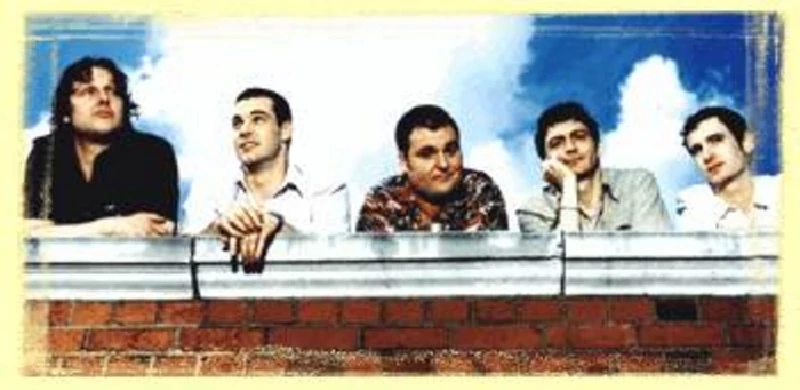
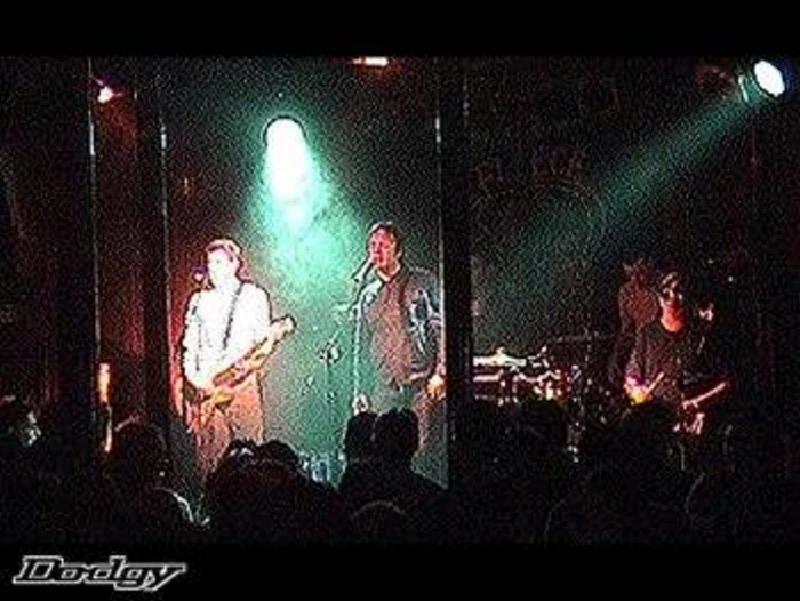
live reviews |
|
Under the Bridge, London, 31/10/2014 |
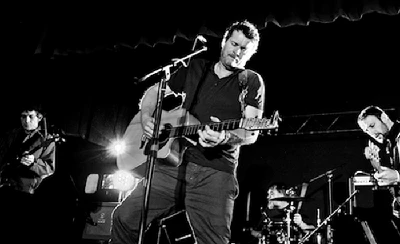
|
| Ben Howarth watches reformed 90's pop outfit Dodgy play a exuberant Halloween show in the unusual location of Under the Bridge in London |
| Prince of Wales Theatre, Cannock, 16/5/2013 |
soundcloud
reviews |
|
What Are We Fighting For (2016) |
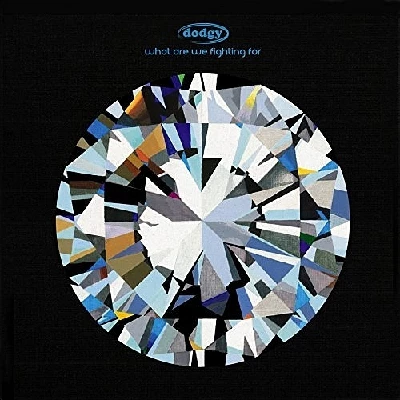
|
| Fantastic latest comeback album from reformed 1990s British indie pop trio, Dodgy |
| Stand Upright in a Cool Place (2012) |
most viewed articles
current edition
Carl Ewens - David Bowie 1964 to 1982 On Track: Every Album, Every SongArmory Show - Interview with Richard Jobson
John McKay - Interview
Colin Blunstone - Thalia Hall, Chicago, 16/7/2025
Billie Eilish - O2 Arena, London, 10/7/2025
Bathers - Photoscapes 1
Visor Fest - Valencia, Spain, 26/9/2025...27/9/2025
Loft - Interview
Sir Tim Rice - Interview
Robert Forster - Interview
previous editions
Manic Street Preachers - (Gig of a Lifetime) Millennium Stadium, Cardiff, December 1999Heavenly - P.U.N.K. Girl EP
Beautiful South - Ten Songs That Made Me Love...
Boomtown Rats - Ten Songs That Made Me Love....
Peter Perrett - In Dreams Begin Responsibilities Interview Part One
Oasis - Oasis, Earl's Court, London, 1995
Trudie Myerscough-Harris - Interview
Coldplay - Wembley Arena. London, 16/8/2022
Prolapse - Interview
Pixies - Ten Songs That Made Me Love...
most viewed reviews
current edition
Davey Woodward - Mumbo in the JumboSick Man of Europe - The Sick Man of Europe
Lucy Spraggan - Other Sides of the Moon
Suzanne Vega - Flying With Angels
Amy Macdonald - Is This What You've Been Waiting For?
Phew, Erika Kobayashi,, Dieter Moebius - Radium Girls
Bush - I Beat Loneliness
Blueboy - 2
Alice Cooper - The Revenge of Alice Cooper
Cynthia Erivo - I Forgive You
Pennyblackmusic Regular Contributors
Adrian Janes
Amanda J. Window
Andrew Twambley
Anthony Dhanendran
Benjamin Howarth
Cila Warncke
Daniel Cressey
Darren Aston
Dastardly
Dave Goodwin
Denzil Watson
Dominic B. Simpson
Eoghan Lyng
Fiona Hutchings
Harry Sherriff
Helen Tipping
Jamie Rowland
John Clarkson
Julie Cruickshank
Kimberly Bright
Lisa Torem
Maarten Schiethart